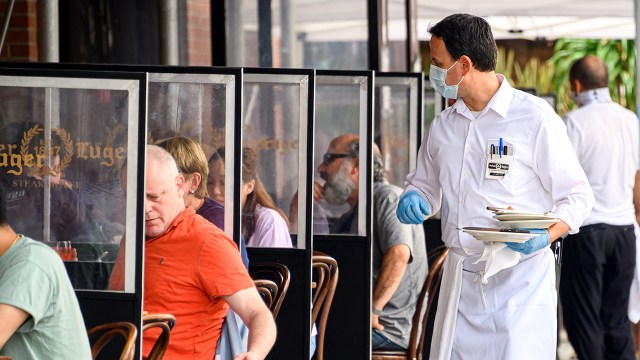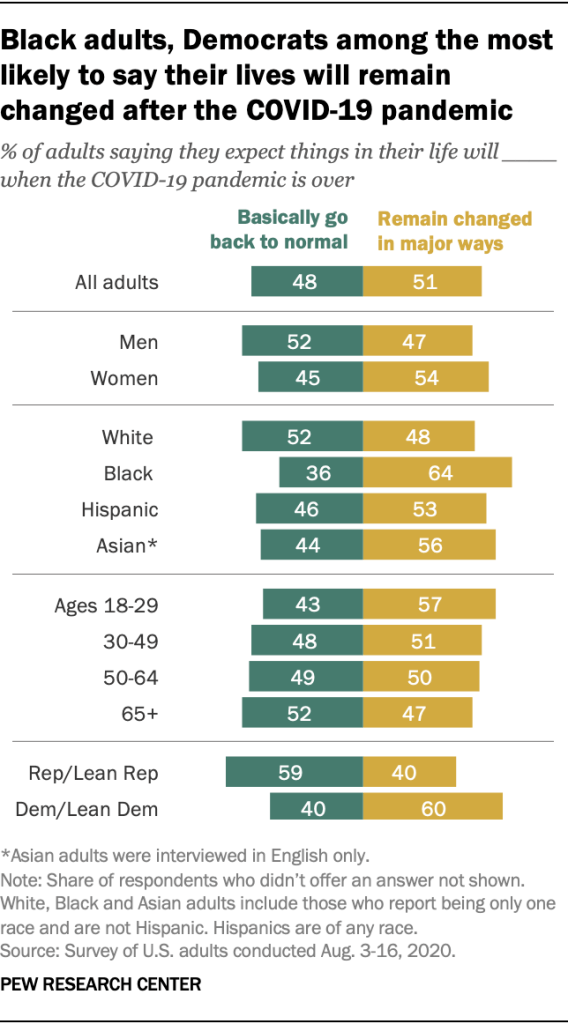
After roughly six months of living amid a pandemic, many Americans expect their lives to remain changed even after the COVID-19 outbreak is over, according to an August Pew Research Center survey of 13,200 Americans.
About half of U.S. adults (51%) say they expect their lives will remain changed in major ways after the pandemic is over, while about the same share (48%) expect a return to normalcy.
Pew Research Center conducted this survey to understand how Americans’ lives are being impacted by the COVID-19 pandemic. For this analysis, we surveyed 13,200 U.S. adults from Aug. 3 to Aug. 16, 2020. Everyone who took part is a member of the Center’s American Trends Panel (ATP), an online survey panel that is recruited through national, random sampling of residential addresses. This way nearly all U.S. adults have a chance of selection. The survey is weighted to be representative of the U.S. adult population by gender, race, ethnicity, partisan affiliation, education and other categories. Read more about the ATP’s methodology.
Here are the questions used for this report, along with responses, and its methodology.
The coronavirus outbreak has disrupted major aspects of American life, including how people work, get an education, attend religious services, care for their children, connect with friends and family, and do things like travel.
It has also affected where some Americans live: In a June survey, around one-in-five U.S. adults (22%) said they either changed their residence due to the outbreak or know someone else who did. And as of July, a majority of adults under 30 are living with their parents for the first time on record, Census Bureau data shows.
Large shares of Americans across most major demographic groups say their lives will remain changed after the pandeamic, according to the August survey. Even so, there are some notable differences.
Roughly two-thirds of Black adults (64%) say their lives will remain changed in major ways after the pandemic is over. That compares with 56% of Asian adults, 53% of Hispanic adults and 48% of White adults.
Democrats and those who lean to the Democratic Party (60%) are much more likely than Republicans and Republican leaners (40%) to say their lives will remain changed after the COVID-19 pandemic. And this gap persists even after controlling for racial differences in party affiliation: For example, 59% of White Democrats – compared with 38% of White Republicans – say their lives will be different after the pandemic is over.
In general, views of the virus – and national, state and local responses to it – have been divided along party lines. Republicans and Democrats have starkly different perspectives on issues ranging from mask wearing to school openings. In a June survey, 61% of Republicans said “the worst is behind us,” but only 23% of Democrats agreed.
Gender is also linked to how people see the post-coronavirus landscape. Women are more likely than men to say they expect their lives will remain changed in major ways (54% vs. 47%). This gender gap exists within the Republican Party, where 44% of Republican women say their lives will remain changed in major ways, compared with 36% of GOP men. However, among Democrats, women (61%) and men (58%) are about equally likely to anticipate major changes.
Adults ages 18 to 29 are more likely than older Americans to say their lives will remain changed in major ways after the pandemic. Some 57% of 18- to 29-year-olds say this, compared with 51% of those ages 30 to 49, half of those ages 50 to 64 and 47% of those 65 and older.
Other recent analyses by Pew Research Center have shown the effects of the coronavirus on young people, beyond moving in with their parents. Nearly three-in-ten young people were neither enrolled in school nor employed between February and June.
Attitudes about whether life will remain changed after the pandemic also differ by household income level. Lower-income (53%) and middle-income adults (51%) are more likely than higher-income adults (46%) to say life will be different for them after the pandemic.
Where people live also shapes their outlook for a post-pandemic future. Some 56% of people who live in urban areas say they expect their lives to remain changed in major ways, compared with 51% of people who live in the suburbs and 46% of people living in rural areas. In the early weeks of the U.S. outbreak, urban areas were hit especially hard due to their dense populations and reliance on public transportation, among other factors.
Personal experiences related to job security and health also come into play when Americans think about the future. Among adults who say they have been laid off or lost a job because of the coronavirus outbreak, 59% say their lives will remain changed in major ways after the pandemic. The share is significantly lower for adults who have not lost a job (50%).
A majority of Americans (57%) who know someone who has been hospitalized or who has died due to COVID-19 say life will be different for them after the pandemic, compared with 48% of those who don’t know someone who has been affected in this way. Even so, adults who live in counties with a higher number of COVID-19 deaths per 100,000 people are no more likely than those who live in areas with a lower number of deaths to say they expect their lives to remain changed in major ways after the pandemic.
Note: Here are the questions used for this report, along with responses, and its methodology.
CORRECTION (October 2020): The methodology section has been updated to reflect the correct cumulative response rate. None of the study findings or conclusions were affected.
CORRECTION (Oct. 12, 2021): Two numbers were incorrect in a previous version of this post. In a June 2020 survey, 23% of Democrats said “the worst is behind us,” referring to the problems the U.S. is facing due to the coronavirus outbreak. And as of August 2020, 36% of GOP men say they expect their lives will remain changed in major ways after the pandemic is over. Neither change affects the study’s substantive findings.




